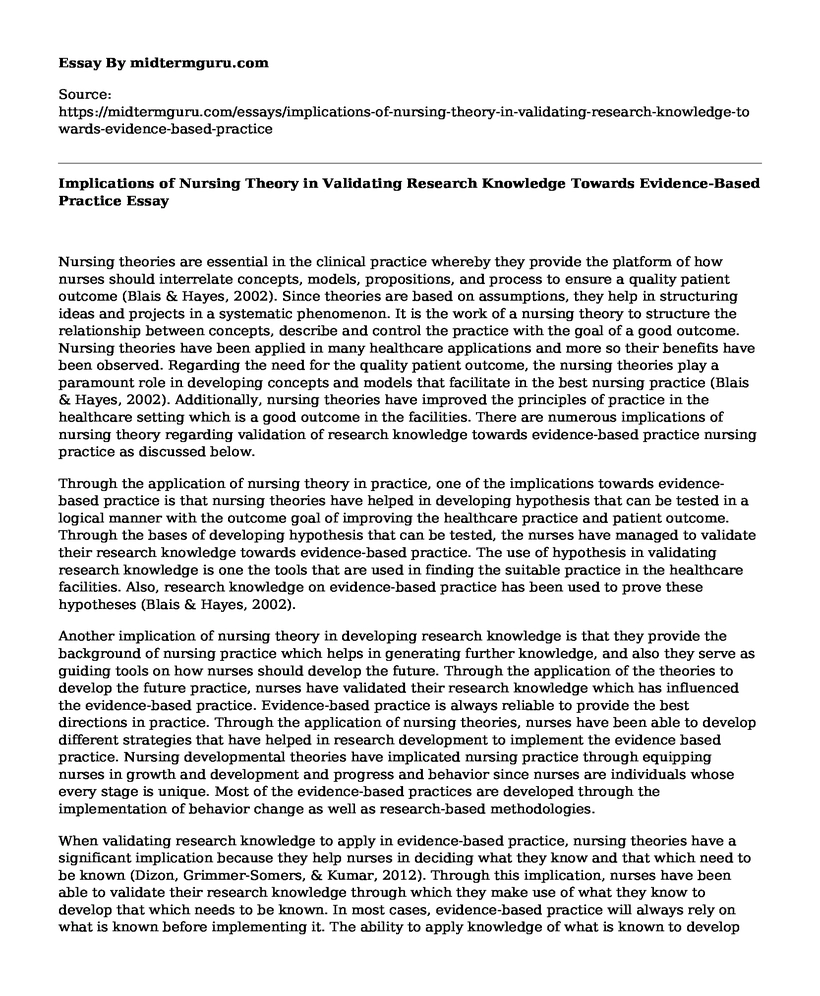Nursing theories are essential in the clinical practice whereby they provide the platform of how nurses should interrelate concepts, models, propositions, and process to ensure a quality patient outcome (Blais & Hayes, 2002). Since theories are based on assumptions, they help in structuring ideas and projects in a systematic phenomenon. It is the work of a nursing theory to structure the relationship between concepts, describe and control the practice with the goal of a good outcome. Nursing theories have been applied in many healthcare applications and more so their benefits have been observed. Regarding the need for the quality patient outcome, the nursing theories play a paramount role in developing concepts and models that facilitate in the best nursing practice (Blais & Hayes, 2002). Additionally, nursing theories have improved the principles of practice in the healthcare setting which is a good outcome in the facilities. There are numerous implications of nursing theory regarding validation of research knowledge towards evidence-based practice nursing practice as discussed below.
Through the application of nursing theory in practice, one of the implications towards evidence-based practice is that nursing theories have helped in developing hypothesis that can be tested in a logical manner with the outcome goal of improving the healthcare practice and patient outcome. Through the bases of developing hypothesis that can be tested, the nurses have managed to validate their research knowledge towards evidence-based practice. The use of hypothesis in validating research knowledge is one the tools that are used in finding the suitable practice in the healthcare facilities. Also, research knowledge on evidence-based practice has been used to prove these hypotheses (Blais & Hayes, 2002).
Another implication of nursing theory in developing research knowledge is that they provide the background of nursing practice which helps in generating further knowledge, and also they serve as guiding tools on how nurses should develop the future. Through the application of the theories to develop the future practice, nurses have validated their research knowledge which has influenced the evidence-based practice. Evidence-based practice is always reliable to provide the best directions in practice. Through the application of nursing theories, nurses have been able to develop different strategies that have helped in research development to implement the evidence based practice. Nursing developmental theories have implicated nursing practice through equipping nurses in growth and development and progress and behavior since nurses are individuals whose every stage is unique. Most of the evidence-based practices are developed through the implementation of behavior change as well as research-based methodologies.
When validating research knowledge to apply in evidence-based practice, nursing theories have a significant implication because they help nurses in deciding what they know and that which need to be known (Dizon, Grimmer-Somers, & Kumar, 2012). Through this implication, nurses have been able to validate their research knowledge through which they make use of what they know to develop that which needs to be known. In most cases, evidence-based practice will always rely on what is known before implementing it. The ability to apply knowledge of what is known to develop what we need to know is a very basic tool in research development which has been applied in designing evidence-based practice. Nursing theory can be used to maintain the professional boundary and form the basis of practice which is an implication into the nursing practice to be able to apply principles and guidelines as required. Validation of research also part of professional boundaries and also a basic practice to improve patient outcome through evidence-based practice (Dizon, Grimmer-Somers, & Kumar, 2012).
Another implication of nursing theories in validating research is equipping nurses with the capacity to predict and explain the phenomenon of nursing practice. By having the ability to predict and explain any phenomenon in practice, nurses have been able to validate their research methods which have been used in evidence-based practice (Gray & Schubert, 2012). In conclusion, nursing theories are the basis of knowledge development which has equipped nurses with extensive knowledge to develop evidence-based practice in their healthcare.
References
Blais, K. & Hayes J. S. (2002). Professional nursing practice: Concepts and perspectives.
Reading: Addison- Wesley.
Dizon, J. M. R., Grimmer-Somers, K. A., & Kumar, S. (December 01, 2012). Current evidence
on evidence-based practice training in allied health: a systematic review of the literature. International Journal of Evidence-Based Healthcare, 10, 4, 347-360.
Gray, M., & Schubert, L. (April 01, 2012). Sustainable social work: Modelling knowledge
production, transfer, and evidence-based practice. International Journal of Social Welfare, 21, 2, 203-214.
Cite this page
Implications of Nursing Theory in Validating Research Knowledge Towards Evidence-Based Practice. (2021, Jun 03). Retrieved from https://midtermguru.com/essays/implications-of-nursing-theory-in-validating-research-knowledge-towards-evidence-based-practice
If you are the original author of this essay and no longer wish to have it published on the midtermguru.com website, please click below to request its removal:
- Essay on the Morality of Reproductive Screening and Technologies
- Proposal Essay: Hand Hygiene
- Case Study: Language Barrier
- Research Paper on Foster Care Subsidies And Social Welfare
- Integumentary System: Skin, Sensors, Anatomy & Function - Essay Sample
- Bromates in Water: EPA Regulation & Testing for Healthier Water - Essay Sample
- Nursing Priorities: Ranking NAND-Approved Diagnoses - Essay Sample







